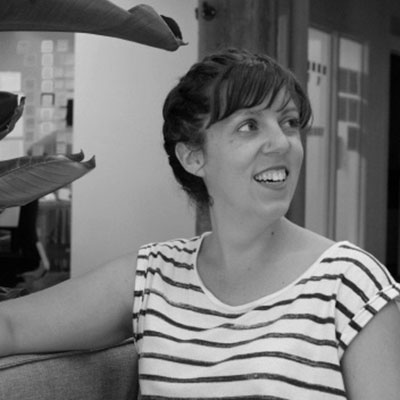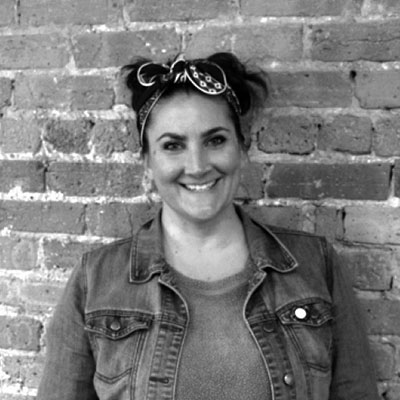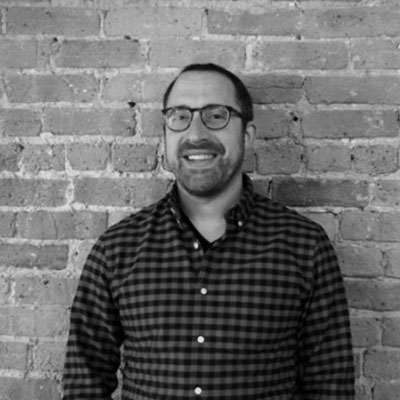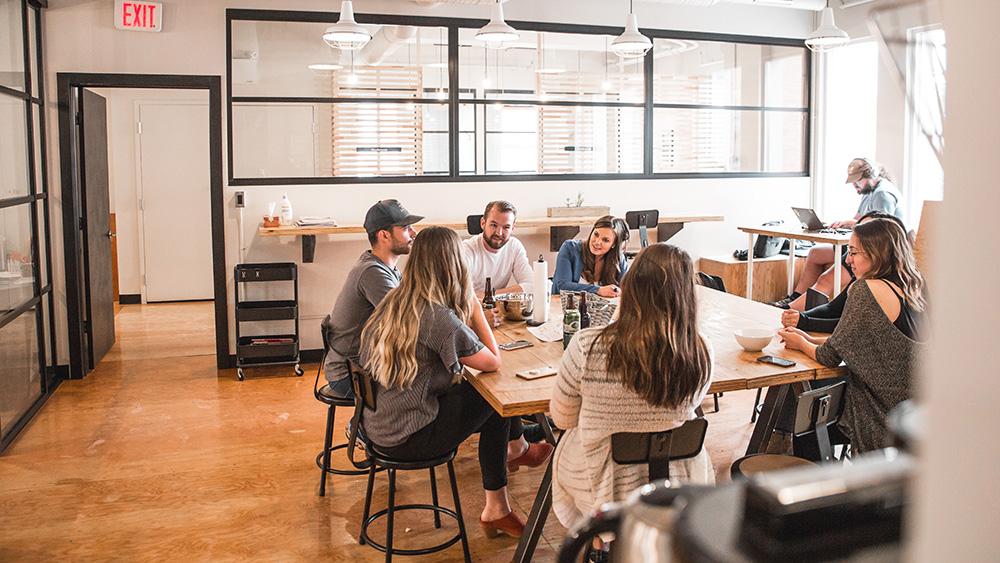2020 has been challenging so far. People around the world have had their lives turned upside down as restrictions have been placed for human-to-human contact due to Covid-19. Here at Grand Studio, we have been able to experience first-hand some of the struggles that have come with trying to maintain a human touch with challenging constraints.
Since Grand Studio’s office is located in Chicago, one of the cities in the United States most impacted by the pandemic, it poses an interesting case for how a growing agency has learned to cope with big changes.

Diana Deibel, Design Director
Diana, How has the pandemic impacted your work at Grand Studio?
The biggest challenge has been personal. I have a four-year-old at home and a partner who also works. We share an office and parenting responsibilities so every morning we negotiate meeting time-slots so that one of us can be with our toddler while the other attends meetings or does work. I’ve had to shift a lot of my personal (non-team or meeting) working hours to night time when I only have one job to do instead of two. I consider our two-job household to be very lucky and privileged. Everyone is healthy, but it’s still hard as h*ll to get everything done when there are more responsibilities around the same time.
What has your team done to adapt to the pandemic?
As a team, we’ve adapted to using online tools (Freehand, Miro, Zoom, Hangouts, etc) more often- though we were already using them in a lighter capacity with remote clients and on our Work-From-Home Fridays. We’ve made a point of extra communication- for example, letting people know where we’re at on something, what we’re thinking about, what we’re doing, and when things may change. As a team leader, I’ve also made a point of checking in with my team more frequently as well as made a point of being silly and goofy in our group communications. In-person culture can get pushed aside during a separation or stressful time, and that’s one of the things people love most about working here.
What are three lessons you’ve learned during this time?
- Care-giving support (childcare, nurse aids, etc.) exists for a reason. It is simply untenable to be working full-time and care-giving full-time. It’s okay to voice that to your team and others to let them know your capacity and when you can get your work done. Historically I’ve not been great at setting boundaries or asking for help, and this has pushed me to do those.
- People need to laugh. Yes, your team needs focus and clarity, but inject some humor and levity into your interactions. We are all struggling in one way or another. Creating an environment where people can uplift each other while being productive is a good practice that will help prevent burn-out and keep retention. Gif it up!
- Your authentic self is your best self. No one has time or energy for the facade right now. It’s been beautiful to be on such a human level with other team mates, our clients, research participants, and others. We are all in sweatpants with cats and kids and Roombas walking around the backgrounds of our virtual meetings. When we can acknowledge that, it creates a bond and allows us to trust one another to create our best work.

Katie Palmer, Director of People
Katie, What’s it like managing Human Resources (HR) during a pandemic?
I think that every HR leader is in uncharted territory. Juggling ongoing changes to mitigate risk, and making sure all employees feel safe and supported, all while considering the safety and well-being of each designer’s family, the Chicago community, and our clients is really challenging. I believe that part of what makes every designer at Grand Studio so special is their drive for solving complex problems. I have learned so much from them on this front and what may have seemed impossible to me before, is now a welcomed challenge. Despite all obstacles, there have been opportunities for growth and connection, and while times may be uncertain, we are in it together.
How have you and your team adapted to not having everyone in the same office?
The team at Grand Studio is very fortunate; before the pandemic, we worked remotely every Friday, so in regards to equipment and communication, our transition was more comfortable than most. I think the real challenge has been making sure everyone feels supported during this time. We are facing the rare problem of juggling our personal lives and work-life in a way that no one could have anticipated. I think we have added a more intense level of understanding, flexibility, and human connection to our culture, even through video chat as we get a deeper glimpse into each other‘s lives.
What are three lessons you have learned during this time?
- Google is a godsend when your toddler decides to jam a pea up their nose.
- It is okay not to be okay. Parenting and working are incredibly hard and messy and will interrupt your day. Know that you are not alone, and cut yourself some slack. Do not be afraid to let your team know how you are doing; chances are they are also feeling overwhelmed and alone. Remember, we are in this together.
- Connection is important. Not only at work but in your personal life, reach out to people you miss and haven’t spoken to, check in on your friends, neighbors, and family. These times can feel so incredibly isolating, but this is a rare chance to reconnect and make space for each other.

Andrew Gold, Chief Experience Officer
Drew, what challenges have you experienced running a design studio during the pandemic?
I think one of the biggest challenges facing us is inspiring a fun and caring culture across the virtual barrier. Not everyone is experiencing or handling the shelter-in-place mandate with ease. People can feel isolated or more disconnected, which can be felt from time to time. Especially with new hires, they are coming into a slightly different company experience than we would normally provide to them when in the office together.
As far as our client relationships go, I don’t think I’ve noticed much of a drop-off considering we were already working remotely with a few of our clients. The one area that has become more challenging is conducting research remotely, where an in-person connection with participants would go much farther.
How has your team adapted or changed due to these challenges?
Things like team socials and company-wide socials on video-chat can be helpful but I think we’re still trying to find our footing in getting everyone involved, creating more enthusiasm, and doing all we can to make people feel like they are a part of something great. Our teams are getting on video chat more, having more conversations, and are looking to better communicate visually with each other in order to build alignment. It is definitely a persistent challenge, but our teams are rising to the occasion.
What are three lessons you’ve learned during this time?
- Being remote challenges the level of empathy required to make sure people feel heard, feel appreciated, and feel connected to the experience we are trying to create.
- The safety and well-being of people in our company is of the utmost importance. We are a small group. At some point we will need to handle going back to work in person. Those decisions need to be treated with the highest degree of sensitivity.
- Finally — taking time for yourself is important. Even more important now that work life and home life seem more blended together. Our project timelines and client requests definitely push us to continue working through lunch, through dinner, or to find random pockets of time to continue working. It’s important for us to not only re-calibrate expectations with our clients (who are likely experiencing the same work/life balance issues) but to simply set aside time for ourselves so that we can continue to maintain those two worlds.
Conclusion
Though the pandemic may eventually end, the values we embrace during this time will hopefully persist- some of those values for us include patience, safety, connection, humor, authenticity, and empathy. Despite the odds, many people have been able to live with a smaller carbon footprint as well. They say every cloud has a silver lining, so even though this pandemic has not been easy, we can still carry something positive from it into the future.
